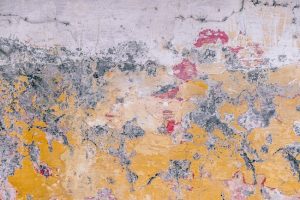
These divrei Torah were adapted from the hashkafa portion of Rabbi Yissocher Frand’s Commuter Chavrusah Tapes on the weekly portion: CD #1073 – Bracha Achrona – How Fast Or Slow Must One Eat? Good Shabbos!
Parshas Metzora deals with blemishes that appear on the walls of homes in Eretz Yisrael (“upon a house in the land of your possession”) [Vayikra 14:34]. Rashi quotes the famous Medrash that the Torah is informing the Jewish people of “good news.” Encountering Tzaraas on the walls of someone’s house is a cloud with a silver lining. “The Emorites hid gold treasure in the walls of their houses all forty years that Israel was in the desert, and as a result of the Tzaraas affliction, the Jew will need to break down the walls of his house, and he’ll find the hidden treasure.”
The Sefas Emes asks, if the Almighty wants to give a person treasure, there are many easier ways than having to break down the walls of his house. So, is it a punishment or a gift? If it is a punishment, let it be a punishment. If it is a present, give it properly, gift-wrapped with a bow on top!
Many years ago, we quoted an amazing insight from the Chidushei HaRim, the grandfather of the Sefas Emes. The Torah says that when Klal Yisrael left Egypt, “And the Children of Israel did according to the word of Moshe and they asked (va’yishalu) the Egyptians for silver vessels and golden vessels and items of clothing.” [Shemos 12:35] The Jews left Egypt enriched. The term va’yishalu is peculiar because it literally means borrowing, and everyone knows that the Jewish people were not borrowing these items – they did not ever intend to return them. Then why does the Torah say that they borrowed from the Egyptians?
The Chiddushei HaRim suggests a powerful thought. This is the first time that the Jewish people, as a nation, are coming into wealth. The Torah teaches us a basic principle about money. As we all know, money has the capacity to be a great blessing, but it also has the capacity to be a great curse. Hashem tells the Israelites: You are coming into money for the first time. Do you know how you need to look at money? “Let them ask (va’yishalu)….” Money is always borrowed. Hashem is lending us money. We have stewardship over it. He wants us to use it in the proper way, but we need to know “The money is mine and the gold is mine, the Word of Hashem, Master of Legions.” [Chaggai 2:8] It is His money. He is lending it to us. To make this point, Hashem tells the Children of Israel: Listen here, you are going to have money now. For the rest of your history, money is going to be a factor, a big factor. I am telling you, look at money as, “And one man asked for from his fellow man (Va’yishalu ish mei’es ray-eihu)”. It is a loan. It is not yours. Do not ever think, “It is my money. I made it.” No. It is His money and He is giving me the privilege of taking care of His money. That sets the tone.
This, explains the sefer Milchamos Yehudah, answers the Sefas Emes’s question regarding why they needed to find the treasures by tearing down the houses. The Ribono shel Olam is teaching us a second lesson about money: Money can destroy houses. Money can destroy a family. The message is that if a person is not careful, money can cause him to rip apart a home. There is a message in that. The message is that such can be the power of money. It can destroy a person’s home.
If someone has any doubt about that, speak to lawyers who deal with estates and how much argument comes about because of money and wills. Money can tear families asunder. The only people who benefit from that are estate attorneys. Sometimes the lawyers’ fees exceed the amount of money remaining for the inheritors! This is the symbolism of Hashem giving the Jews the money, but providing them with it in a way that it was necessary to destroy their homes to acquire it.
Transcribed by David Twersky; Jerusalem [email protected]
Technical Assistance by Dovid Hoffman; Baltimore, MD [email protected]
This week’s write-up is adapted from the hashkafa portion of Rabbi Yissochar Frand’s Commuter Chavrusah Series on the weekly Torah portion. A listing of the halachic portions for Parshas Metzora is provided below:
- CD# 007 – Self-Defense
- CD# 051 – Moser: The Dilemma of the Jewish IRS Agent
- CD# 094 – Hallel on Yom Ha’Atzmaut?
- CD# 142 – Eyeglasses in Halacha
- CD# 189 – Mikveh: Tevillah and Chaziza
- CD# 279 – Women’s Testimony in Hilchos Niddah
- CD# 325 – The Microscope in Halacha
- CD# 369 – Bris Millah That Causes Chilul Shabbos
- CD# 413 – Speaking Lashon Horah on Baalei Machlokes
- CD# 457 – Getting an Aliyah After Childbirth
- CD# 501 – Milah and the Sick Baby
- CD# 545 – Dangerous Medical Procedures
- CD# 589 – Pidyon Haben – Daytime or Night?
- CD# 633 – Lashon Harah and Lashon HaTov
- CD# 677 – Tallis Koton — Wool or Cotton?
- CD# 721 – Eruv Pesach – Mores Special Than You Think
- CD# 765 – How Many Mitzvos of Sefira Are There?
- CD# 809 – Netilas Yadayim – Things You Never Knew
- CD# 853 – Mila on Shabbos: Fascinating Questions
- CD# 897 – Insights Into Sefiras Ha’Omer
- CD# 942 – Kiddush Hashem – Is Everyone Obligated?
- CD# 984 – “What’s Tonight’s Sefira?” and other Sefira Issues
- CD#1028 – Davening Maariv Early: Does it Make it Tomorrow?
- CD#1073 – Bracha Achrona – How Fast Or Slow Must One Eat?
- CD#1115 – Office Lashon Horah – How Far Must You Go To Avoid It?
- CD#1157 – But the Butcher I Buy From Has a Reliable Reputation!
- CD#1201 – The Shabbos Bris and the Borei P’ri Ha’gefen
- CD#1246 – Wearing Sunglasses on Shabbos? Contact Lenses? A Lens that Popped Out? and other “Glasses on Shabbos” Issues
- CD#1288 – An Aliyah After Your Wife Gives Birth Revisited
- CD#1333 – Oops! There is a Sticker on the Kli I Just Toiveled – Must I Toivel It Again?
A complete catalogue can be ordered from the Yad Yechiel Institute, PO Box 511, Owings Mills MD 21117-0511. Call (410) 358-0416 or e-mail [email protected] or visit http://www.yadyechiel.org/ for further information.


